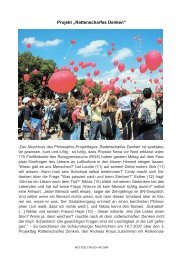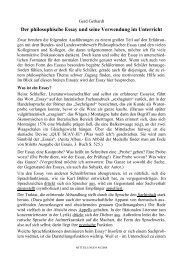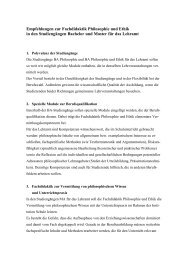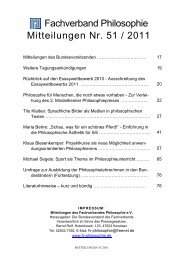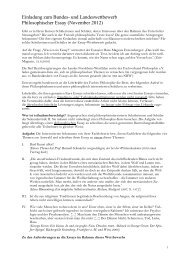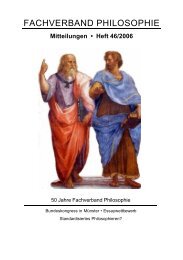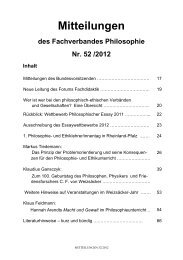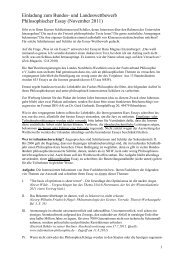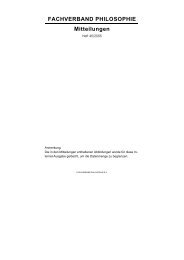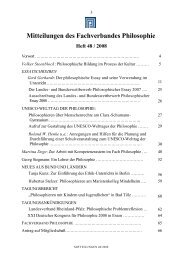Mitteilungen 49/2009 - Fachverband Philosophie e.v.
Mitteilungen 49/2009 - Fachverband Philosophie e.v.
Mitteilungen 49/2009 - Fachverband Philosophie e.v.
Sie wollen auch ein ePaper? Erhöhen Sie die Reichweite Ihrer Titel.
YUMPU macht aus Druck-PDFs automatisch weboptimierte ePaper, die Google liebt.
Jan Seidel (Jgst. 13, Landfermann-Gymnasium Duisburg)<br />
Thema: In der unaussprechbaren Herrlichkeit des Sternhimmels war irgendwie Gott<br />
gegenwärtig. Zugleich aber wusste ich, dass die Sterne Gaskugeln sind, aus Atomen<br />
bestehend, die den Gesetzen der Physik genügen. Die Spannung zwischen<br />
diesen beiden Wahrheiten kann nicht unauflöslich sein. Wie aber kann man sie lösen?<br />
(Carl Friedrich von Weizsäcker)<br />
Staring or seeing<br />
Somehow it seems to be hopeless for religion and philosophy nowadays.<br />
Today the perspective of sciences has played a decisive role in any kind of<br />
explanation which formerly exclusively belonged to interpretations by humanities or<br />
religion. Neither the cosmos nor the subject itself is safe against an abstract<br />
explanation by means of functions and correlations between different objects like<br />
neurons or molecules, thus giving the impression of an existence “as it is” or as it is<br />
constructed by the human brain. Philosophy or religion are disfigured to no more<br />
than a helpful or useful way of thinking in everyday life, almost fully explicable in<br />
evolutionary terms and dependent on the development of sciences: it is only a<br />
matter of time when the ancient astonishment about an incomprehensible world will<br />
be replaced by a system of abstract formulas and descriptions which give the<br />
impression of objectivity and rationality: in spite of quantum mechanics and chaos<br />
theory, future technological and scientific progress will solve these bothering inexplicable<br />
rests of nature.<br />
Is there even a possible, conceivable place for the meaning of God and his creation<br />
in a world without an escape, without the possibility of a flight into the infinite? Can<br />
we simply put God between the indeterminable conditions of quanta, between the<br />
contradicting correlation of chance and necessity in the chaos theory, between being<br />
and not-being? Or is this “between” not a category which is only of transitive<br />
use, which will be replaced sooner or later by rational scientific explanations?<br />
Thus: is the decision between sciences and religion finally an Either – Or (Entweder<br />
- Oder) or a Both – And (Sowohl als auch)?<br />
Weizsäcker tries to find words for the contradictory feeling of both presence and<br />
absence, of astonishment and indifference, of the infinity of an unspeakable, quiet<br />
truthand the finiteness of the formal laws of physics, which all accompany his existence.<br />
The lack of one category seems to be balanced by the other category: While<br />
scientific discourses have an unquestionable truth-claim, rationalizing both world<br />
and human being, banishing any kind of religious interpretation from the beginning,<br />
they lack giving man a reason to live (“Seinsgrund”), an explanation of his being on<br />
earth and his hope for the future: human existence suffers from his own explanations.<br />
But what is the basis of sciences if not the existence of the human being itself, the<br />
centre of which any kind of explanation begins to make sense? If we distinguish between<br />
the present experiences of our consciousness and an objective world, which<br />
has to have its legitimacy without an observer, we separate our present existence<br />
from a distant world, thus repeat the Cartesian separation of “res cogitans” and “res<br />
MITTEILUNGEN <strong>49</strong>/<strong>2009</strong><br />
21



